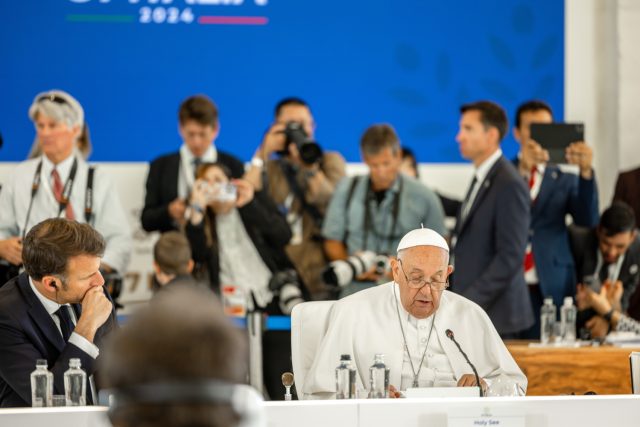
One of the great achievements of the Italian-led G7 summit in Puglia on 13-15 June was Pope Bergoglio’s intervention in the debate on Artificial Intelligence. For the first time, in fact, a Pontiff attended a meeting of this summit: an important success for President Meloni, especially for the depth and absolute centrality of the topics touched upon by Pope Francis.
A ‘fascinating and tremendous’ tool
Listening to the words of the representative of a millenary institution on a subject as topical as Artificial Intelligence is anything but obvious. In fact, the Pontiff touches on several topics as well as launching challenges to international politics that are so high as to make one’s wrists quiver, to say the least. Bergoglio spoke of Artificial Intelligence as a ‘fascinating and tremendous’ instrument, but placed it firmly in the hands and decisions of men. AI is in fact considered, in the Pontiff’s lesson, as the fruit of the extraordinary creative potential given by God to mankind, a tool that will increasingly influence our way of life, social relations and in the future even the way we perceive our identity as human beings. The risk recalled is that we will end up defining ourselves – as humans – as something other than artificial intelligence. A theme that cannot but generate fear because of the consequences it would portend.
An instrument at the service of good or evil
In any case, the Pontiff’s reflection relegates AI to the role of an instrument. Hence, its ultimate value in the service of good or evil depends solely on the use that we decide to make of it. Unfortunately, in many cases humanity itself, Bergoglio then reminded us, is an enemy of itself and of the planet. What we are experiencing, according to the Pontiff, is a true cognitive-industrial revolution that will contribute to the creation of a new social system characterised by complex epochal transformations. On one hand there is the possibility of great scientific and technological progress, while on the other one there is the possibility that the ever-increasing use of artificial intelligence could lead to greater injustice between advanced and developing nations, between the dominant and oppressed classes.
Between ethics and “algorethics”
As already mentioned, the Pontiff’s reflection touched on lofty themes such as ethics – considered as the condition between freedom and responsibility as well as the difference between choice and decision. In fact, Bergoglio sees artificial intelligence as nothing more than an ability to choose, based on statistical data and probability, while man is not only capable of choosing, but also of deciding in another ways. This is what must remain at the basis of human experience, otherwise the dreaded risk is that of condemning mankind to a hopeless future at the sole dependence of choices calculated by machines.
A concept that is easily connected to the current conflicts and the growing debate on the use of AI in theatres of war with the development of lethal autonomous weapons. In this case, the call is for human dignity to be put back at the centre and brought as the cornerstone of an ethical proposal that can be shared as much as possible.
It is here that the Pontiff recalled and expanded on the concept of ‘algorethics’, which he had already expressed when signing the ‘Rome call for AI ethics’ in 2020. The need, therefore, to achieve an ethical moderation of the algorithms underlying these new technologies. The theme remains that of finding a shared hierarchy of values, and this is the first great challenge launched by the Pontiff to the Big Seven and to international politics. Bergoglio’s impulse is to find a set of shared principles that can serve to address and dissolve the ethical dilemmas that can be encountered in the development of these technologies.
The challenge to politics
The second and final challenge was launched by the Pontiff at the political class, and it’s perhaps the most important and complex one. Politics, for Bergoglio, must be healthy in order to address the major structural deficiencies in world society. There is no need for small patches, said the Pontiff, but one must have the strength to go to the root. This is the only way to lead an integrated economy, a political and social project that looks at the common good and is also able to direct tools such as artificial intelligence towards this new world. It is therefore up to everyone to make good use of Artificial Intelligence, but it is politics that must create the conditions for it to really bear fruit.



 Subscribe
Subscribe